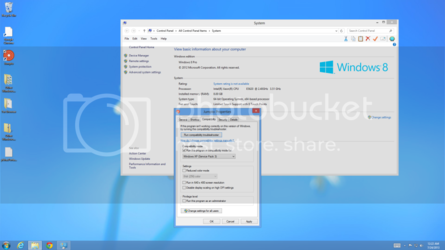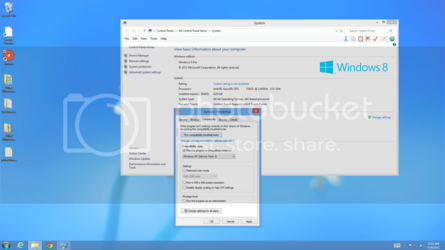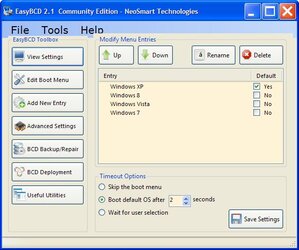- Joined
- Mar 25, 2011
- Location
- Pacific NW USA
I'm in the middle of a server swap for a small psychiatric office (good thing too, I might need some therapy by the time I'm done thanks to MS) from Win SBS 2003 to Win Server 2012. Believe it or not, as a server, Win 2012 which is based on Win 8 actually runs and works out very well. During the process it's become apparent though that they need to ditch the 5 remaining XP installs and get those upgraded as well. So, now we come to the crux of the matter. One of the computers they ordered (without consulting me as to which one they should get) came in and guess what, it's a spiffy new Win 8 pro. But I thought, what the heck, one of the office workers (who is very computer savvy by the way) was willing to take the plunge and use that one instead of 7 pro so why not give them that one and see how good or bad that works out in an office environment. One of the issues that has come up in the past is that there is a legacy program that absolutely MUST be used, albeit only once a month, that will work on Windows 7 but loses printing capabilities which they absolutely need to have. The solution was to run the program within XP mode on the Win 7 pro computers where it will be used and life goes on all hunky dory and all is well. Well the office worker who volunteered to take Win 8 pro is, you guessed it, one of those who have XP and need to use that legacy programming (and before anyone starts saying "well have someone else do it" it deals with billing and claims and that is the person's role). And you guessed it again, XP mode is NOT supported in Win 8 Pro. The only solution in that circumstance, and still remain kosher in the eyes of MS and their nightmare licensing rules and requirements, would be to install virtualbox or virtualization software, purchase a full copy of Windows XP somewhere (No it can't be an OEM or Upgrade copy according to MS license terms), and then set up the legacy software on the newly created XP VM running within 8.
Have you been left speechless yet? No? Let me put it this way then. In conclusion, MS wants you to spend money to upgrade to an operating system that MANY if not most consumers have many problems with and hate using it, and MS STUBBORNLY refuses to capitulate to in order to push people into the metro and start buttonless OS environment (NO 8.1 doesn't have the start menu back no matter what they say, it's not even close to the functionality of the start menu) that they believe is the "future" for whatever reason no matter what the customers want. In this case they want the customer to pay $199 for a windows 8 pro upgrade license. And before any of you say "well the OEM version is cheaper, to install the OEM version on a preexisting computer, i.e. you're upgrading the OS, is a violation of MS's terms of use license which for a business is a big deal. All it takes is a disgruntled employee calling up MS to turn you in and collect a reward (yes there is a reward) and they will disable every software license they have on file for your business until you pay their "fees" and bring yourself back into compliance. Unless you're actually building new computer or replacing enough hardware that MS considers it the same as a "new" computer, you MUST purchase a full version or upgrade to migrate to win 8 from win7 and still stay within the requirements of the EULA. So they want you to pay $200 to upgrade from Win 7 pro to Win 8 pro, in return you receive less functionality, AND if you want that functionality back you have to spend even MORE money. In summary, spend money, get less, spend more money to get back what you had. And people actually wonder why Balmer made the worst CEO list? Seriously??
Take this advice to heart, if you have windows 7, don't bother with an upgrade to 8 unless you're A)not using it for work and B)have a touch screen laptop or tablet. Wait until MS is done playing with all of the guinea pigs and do what they should have done in the first place, or they continue to crash and burn so badly that it actually pushes people to Linux, Mac, or something new and one of those takes over the market.
Have you been left speechless yet? No? Let me put it this way then. In conclusion, MS wants you to spend money to upgrade to an operating system that MANY if not most consumers have many problems with and hate using it, and MS STUBBORNLY refuses to capitulate to in order to push people into the metro and start buttonless OS environment (NO 8.1 doesn't have the start menu back no matter what they say, it's not even close to the functionality of the start menu) that they believe is the "future" for whatever reason no matter what the customers want. In this case they want the customer to pay $199 for a windows 8 pro upgrade license. And before any of you say "well the OEM version is cheaper, to install the OEM version on a preexisting computer, i.e. you're upgrading the OS, is a violation of MS's terms of use license which for a business is a big deal. All it takes is a disgruntled employee calling up MS to turn you in and collect a reward (yes there is a reward) and they will disable every software license they have on file for your business until you pay their "fees" and bring yourself back into compliance. Unless you're actually building new computer or replacing enough hardware that MS considers it the same as a "new" computer, you MUST purchase a full version or upgrade to migrate to win 8 from win7 and still stay within the requirements of the EULA. So they want you to pay $200 to upgrade from Win 7 pro to Win 8 pro, in return you receive less functionality, AND if you want that functionality back you have to spend even MORE money. In summary, spend money, get less, spend more money to get back what you had. And people actually wonder why Balmer made the worst CEO list? Seriously??
Take this advice to heart, if you have windows 7, don't bother with an upgrade to 8 unless you're A)not using it for work and B)have a touch screen laptop or tablet. Wait until MS is done playing with all of the guinea pigs and do what they should have done in the first place, or they continue to crash and burn so badly that it actually pushes people to Linux, Mac, or something new and one of those takes over the market.



 You'd be shocked to learn how many computers with Win 8 on them were bought by companies as "bulk" purchases, who then downgraded and deployed them with Win 7 pro. Don't buy into the garbage coming from MS when they say "see we sold 100 million licenses". They know FULL well that number includes ALL licenses sold to OEM's still sitting on a PC in a warehouse waiting to be sold, AND all those PC's that were bought and then downgraded. There are not 100 million computers out there actually USING windows 8. And you wonder why.
You'd be shocked to learn how many computers with Win 8 on them were bought by companies as "bulk" purchases, who then downgraded and deployed them with Win 7 pro. Don't buy into the garbage coming from MS when they say "see we sold 100 million licenses". They know FULL well that number includes ALL licenses sold to OEM's still sitting on a PC in a warehouse waiting to be sold, AND all those PC's that were bought and then downgraded. There are not 100 million computers out there actually USING windows 8. And you wonder why.
